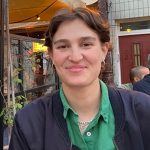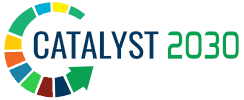Catalyst 2030 Team in Focus
This month’s team spotlight falls on the Donor Relations team. This is the team powering Catalyst 2030’s quest to strengthen the work and impact of social innovators with funding that is accessible, equitable and builds partnerships.

Donor Relations Facilitator
Matt Patten
About Matt
Matt Patten has spent over 20 years leading high-value and high performing fundraising teams. He considers himself a relationship builder at heart and is passionate about mobilising resources from individuals, foundations and the private sector.
Matt has built collaborative and complex strategic partnerships with industry leaders such as Britvic, Fitbit, AstraZeneca and Tesco. The foundation partnerships he has developed include ones with Garfield Weston, Wolfson, Wellcome, Skoll and Mastercard. He has also developed deep, collaborative relationships with many leading global philanthropists.
Now happily nestled in the Catalyst 2030 family, Matt helps to mobilise resources and to create an enabling environment for social innovation. “It’s a new and exciting way of working in a member-led and collaborative approach. It is one that I am learning more about every day,” he enthuses.
Outside of work Matt enjoys walking his dog, visiting art exhibitions and seeing as much theatre as he can. He also likes (“perhaps not so healthily,” he says) indulging in his passion for cheese!
Q and A
What do you enjoy most about Catalyst 2030?
The change that’s happening. Catalyst 2030 members are at the forefront of working to reimagine and rewrite the rules for a future that are good for people and the planet. From transforming ways of managing capital and the instruments that will make it flow, to developing regenerative food systems and mind-blowingly innovative work to create a sustainable and flourishing natural environment, the list goes on. But I would challenge anybody not to be inspired by the people who are the beating heart of this movement.
Why is systems change work close to your heart?
A few years ago I noticed a creeping disillusionment with my work and realised the issues I was working on were continuing on their trajectory of growth, despite all our best efforts. Why? Because the well-intended projects were treating the symptoms of bigger issues and not addressing the root causes. I started to learn about systems change and had a ‘light bulb’ moment. Of course this is what we should be doing! I couldn’t look back.
What is your dream job?
I’m not too far away from my dream job right now. I’ve dedicated most of my career and free time to social and environmental development. I think the future will see me moving closer to the ‘doer’ side. I hope to realise my aspirations of setting up my own business with a mission-locked core of helping young people to get a solid start in life through training and education.

Enabling Environment Coordinator for Funding
Melissa (Mel) Beeston
About Mel
Mel contributes to thought leadership pieces which help Catalyst 2030 to advocate for funding practices that are grounded in equity, partnership and collaboration, in support of the social economy.
Q and A
What do you enjoy most about Catalyst 2030?
I enjoy working directly with members. Catalyst 2030 is made up of so many great social innovators and funders who are working to address systemic challenges. I always leave these conversations feeling inspired and energised.
Why is systems change work close to your heart?
I feel that systems change work is essential if we are to truly address global challenges. Without delving deeper into the reasons why a particular problem has emerged, we will only scratch the surface of global challenges. Delving deeper means addressing failed systems.
What is your dream job?
I’m not quite sure of my dream job. I know I like working in systems change and with social innovators. I also love food and cooking. My dream would be to find a way to combine all of these elements.

Donor Relations Intern
Idara Atakpa
About Idara
Q and A
What do you enjoy most about Catalyst 2030?
The people and the system. It is an organisation filled with people who are motivated to create lasting change, and the system allows for active participation.
Why is systems change work close to your heart?
I believe that for actual change to occur, a change/shift in the system needs to take place. This is one of my core tenets. Whenever it feels like something isn’t working, it is always a cue to re-evaluate my actions, make changes where necessary and employ new and improved strategies. This is why it is close to my heart. I believe that this can also be applied to society at large. As a society, we must change the norms, behaviours and structures that encourage the unequal distribution of resources. We must embrace new and improved strategies that foster a more equal society.
What is your dream job?
I do not dream of labour. I’m joking! My dream job would involve people, flexible hours and lots of nature. Being a field researcher on topics relating to sociology and/ or nature conservation might be ideal.

Donor Relations Intern
Inês Marques
About Inês
A Master’s in International Relations student, Inês’ academic interests include migrations, equality and inclusion. Her research focuses on the need for systemic change and the failure of the mechanisms of social inclusion and equality in education of migrants and refugees in Portugal.
She is passionate about social justice, inclusion and equality, always considering the SDGs. Before joining Catalyst 2030 she had work experience with two large UN agencies and also volunteered for causes and organisations close to her heart in areas such as equality and social fairness.
Q and A
What do you enjoy most about Catalyst 2030?
I enjoy its mission and collaboration spirit the most. I believe we can have all the resources and guidance, but without the energy and commitment from movements such as Catalyst 2030, which brings together so many innovators and entrepreneurs, it would not be possible to create a great response to the much-needed call for change.
Why is systems change work close to your heart?
I believe that to actively and decisively confront the root problems of any global problem, there is a need for systems change work. This requires innovation, as well as constant learning and adaptation. That is what I appreciate the most.
What is your dream job?
I think I am still too young to answer this question. However, since very early on I have felt that my dream job, whatever it might be, needs to make an impact in society and contribute to a better world. I would love to continue to work with international relations and communications in the humanitarian context, focusing on inclusion and equality. I see myself working within an enterprise organisation, an NGO, or an international organisation.
